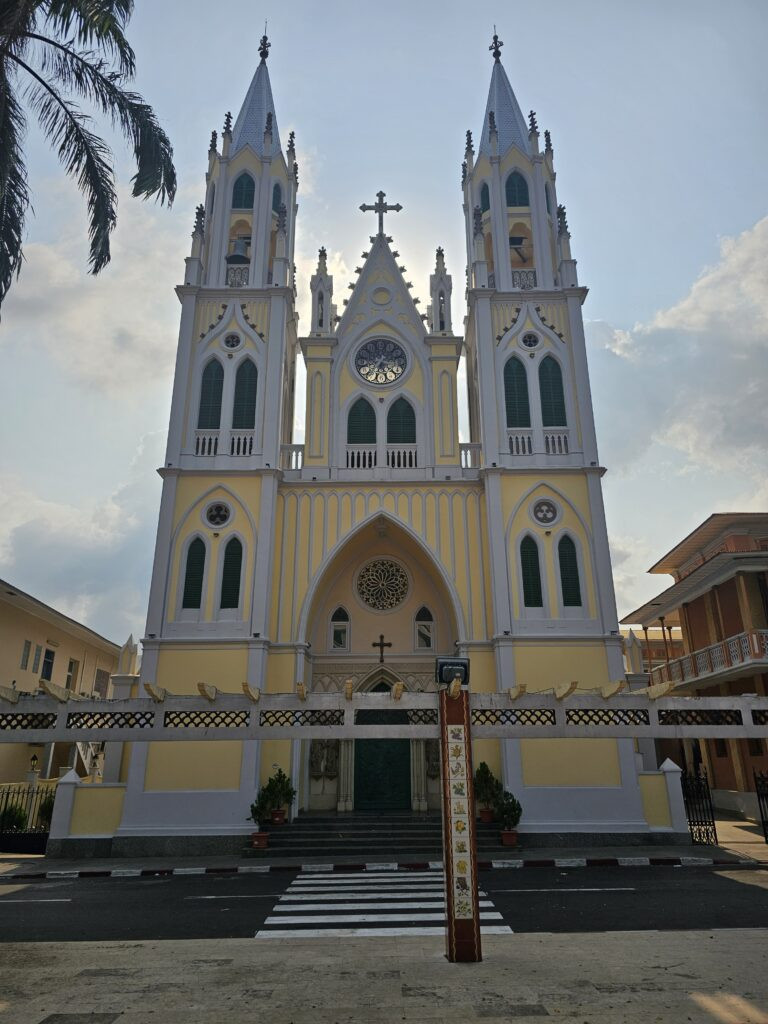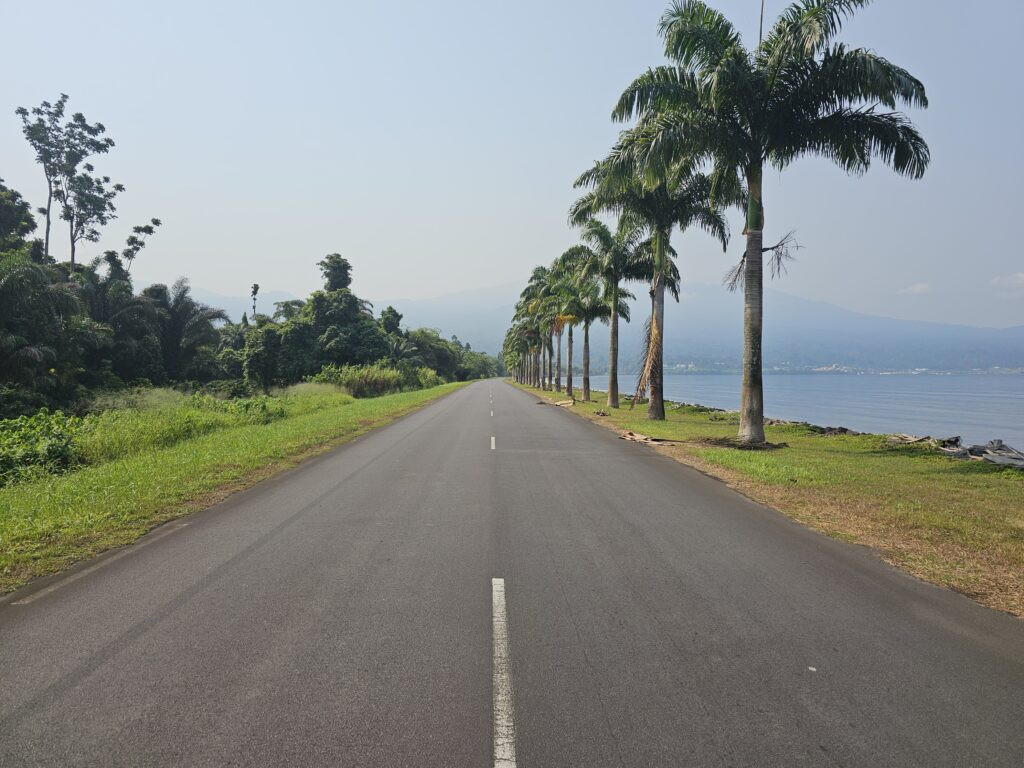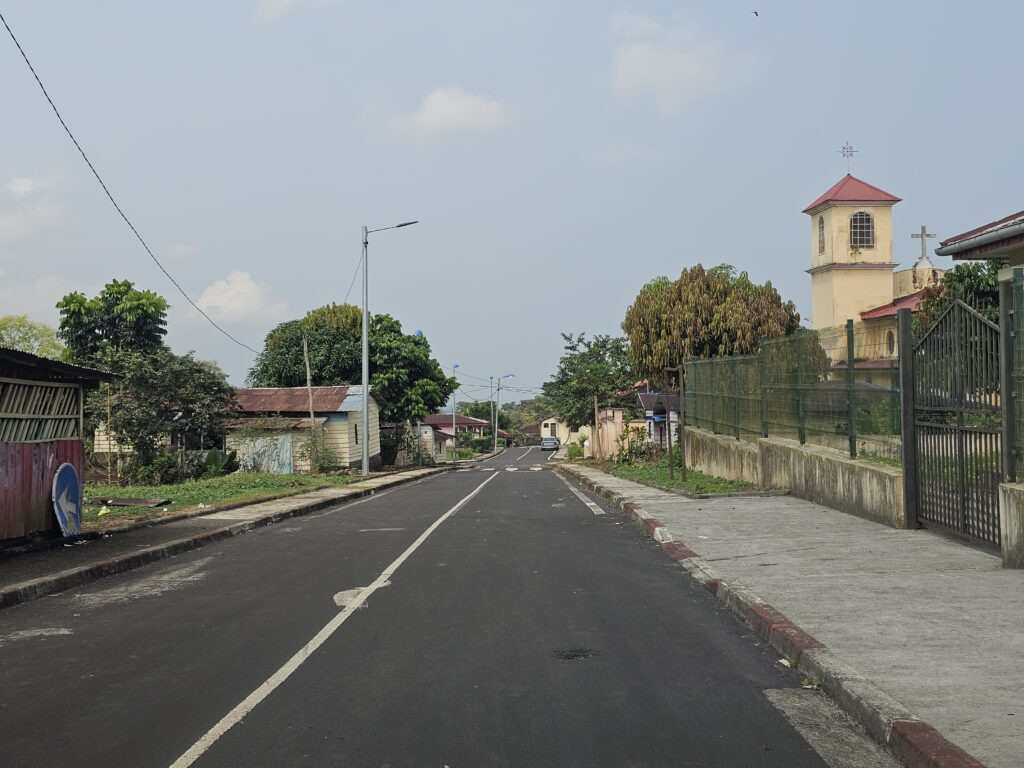Equatorial Guinea Tourism And Attractions offer a unique and largely untouched travel experience; SIXT.VN can help you navigate this fascinating destination. We provide convenient services such as airport transfers, hotel bookings, and guided tours to make your Equatorial Guinea adventure seamless and unforgettable. Let’s unlock the wonders of this hidden gem.
1. What Makes Equatorial Guinea Tourism and Attractions Unique?
Equatorial Guinea tourism is unique because it offers a blend of unspoiled natural beauty and distinct cultural experiences. This Central African nation, composed of the mainland Río Muni and the island of Bioko, presents travelers with a chance to explore lush rainforests, pristine beaches, and a unique fusion of Spanish, African, and indigenous traditions.
Equatorial Guinea’s unique appeal lies in its relative obscurity as a tourist destination. Unlike many other African countries, it remains largely untouched by mass tourism, offering a more authentic and adventurous experience. The country’s history as a former Spanish colony adds a layer of cultural richness, evident in its architecture, language, and customs.
-
Bioko Island: Home to the capital, Malabo, this volcanic island boasts stunning landscapes and diverse wildlife.
-
Río Muni: The mainland region offers dense rainforests, ideal for ecotourism and wildlife spotting.
-
Spanish Influence: Discover colonial-era architecture and a distinct cultural blend that sets Equatorial Guinea apart.
-
Untouched Beauty: Experience landscapes largely unaffected by mass tourism, providing a unique and authentic adventure.
2. What Are the Top Attractions in Equatorial Guinea?
The top attractions in Equatorial Guinea range from natural wonders to cultural landmarks, providing a diverse array of experiences for visitors. Here’s a curated list to ignite your wanderlust:
-
Malabo: Explore the capital city with its colonial architecture, including the iconic St. Elizabeth’s Cathedral. Stroll along the Paseo Maritimo for scenic views.
-
Pico Basilé: Hike or drive to the summit of the highest mountain in Equatorial Guinea for breathtaking panoramic views of Bioko Island. Note that a permit may be required, so it’s best to check in advance.
-
Playa de Arena Blanca: Relax on the beautiful white sands of Playa de Arena Blanca. Although the sand might not be perfectly white, this beach offers an appealing spot for relaxation.
-
Ureka: Known as one of the most beautiful places on Bioko Island, Ureka is famous for its turtle nesting sites. Consider an overnight stay to witness the incredible hatching process (permits and planning are crucial).
-
Moka: Discover the Mirador del Lago Biao near Moka, which involves a several-hour hike but rewards you with stunning crater lake views.
-
Hacienda Marcos: Experience this unique complex, a blend of hotel, amusement park, and presidential vacation residence, offering insight into the country’s infrastructure and amenities.
-
National Park near the Airport: Enjoy a peaceful retreat at this botanical garden, home to the Ceiba tree, the national tree of Equatorial Guinea.
 St. Elizabeth Cathedral in Malabo, Equatorial Guinea
St. Elizabeth Cathedral in Malabo, Equatorial Guinea
3. What Activities Can I Enjoy During Equatorial Guinea Tourism?
During your Equatorial Guinea tourism adventure, you can enjoy a range of activities tailored to different interests. Here are some popular options:
-
Ecotourism and Wildlife Spotting: Explore the dense rainforests of Río Muni and Bioko Island, home to diverse flora and fauna. Guided tours can help you spot monkeys, birds, and other wildlife.
-
Beach Relaxation: Unwind on the pristine beaches of Bioko Island, such as Playa de Arena Blanca, Riaba Beach, and Sipopo Beach. Enjoy swimming, sunbathing, and beachside picnics.
-
Hiking and Mountain Climbing: Challenge yourself with a hike to the summit of Pico Basilé, the highest mountain in the country. Enjoy panoramic views of the island and surrounding landscapes.
-
Cultural Immersion: Visit local villages and towns to experience the culture and traditions of Equatorial Guinea. Interact with locals, sample traditional cuisine, and learn about the country’s history and heritage.
-
City Tours: Explore the capital city of Malabo, visiting historical landmarks such as St. Elizabeth’s Cathedral and the Presidential Palace. Stroll along the Paseo Maritimo and enjoy the vibrant atmosphere.
-
Turtle Watching: Visit Ureka during the nesting season to witness the incredible spectacle of turtles laying their eggs or hatchlings making their way to the sea. This is a must-see for nature enthusiasts.
4. What is the Best Time to Visit Equatorial Guinea?
The best time for Equatorial Guinea tourism is during the dry season, which typically runs from December to February. During these months, you can expect less rainfall, making it ideal for outdoor activities and exploring the country’s attractions.
-
Dry Season (December to February): Ideal for beach visits, hiking, and exploring rainforests with less rainfall.
-
Shoulder Seasons (March-May & September-November): These periods can also be pleasant, with fewer tourists and manageable weather conditions.
-
Rainy Season (June to August): This period sees heavy rainfall, potentially disrupting travel plans, but it also brings lush greenery and vibrant landscapes.
5. How Can SIXT.VN Enhance My Travel Experience in Equatorial Guinea?
SIXT.VN enhances your travel experience in Equatorial Guinea by providing convenient and reliable services tailored to your needs. With SIXT.VN, you can enjoy seamless airport transfers, comfortable hotel bookings, and expertly guided tours, ensuring a stress-free and unforgettable adventure.
-
Airport Transfers: Start your trip with ease by booking a reliable airport transfer with SIXT.VN. Our professional drivers will ensure you reach your hotel safely and comfortably, without the hassle of navigating unfamiliar transportation systems.
-
Hotel Bookings: SIXT.VN offers a curated selection of hotels in Equatorial Guinea, catering to various budgets and preferences. Whether you’re looking for luxury accommodations or budget-friendly options, we can help you find the perfect place to stay.
-
Guided Tours: Explore Equatorial Guinea’s attractions with our expertly guided tours. Our knowledgeable guides will take you to the must-see sights, providing insights into the country’s history, culture, and natural beauty.
-
Customized Itineraries: SIXT.VN can create customized itineraries tailored to your interests and preferences. Whether you’re interested in ecotourism, cultural immersion, or beach relaxation, we can design a personalized itinerary that meets your needs.
-
24/7 Support: Enjoy peace of mind with our 24/7 customer support. Whether you have questions about your booking or need assistance during your trip, our dedicated team is always available to help.
-
Convenience: With SIXT.VN, you can book all your travel needs in one place, saving you time and effort. From airport transfers to hotel bookings and guided tours, we’ve got you covered.
6. What Are Some Essential Travel Tips for Equatorial Guinea Tourism?
Equatorial Guinea tourism requires some preparation to ensure a smooth and enjoyable trip. Here are essential travel tips to keep in mind:
-
Visa Requirements: Ensure you have the necessary visa and travel documents before your trip. Equatorial Guinea offers an e-visa, which can be obtained online, but it’s essential to apply well in advance.
-
Health Precautions: Consult your doctor about necessary vaccinations and health precautions before traveling to Equatorial Guinea. Malaria is a risk, so take appropriate measures to prevent mosquito bites.
-
Currency: The currency in Equatorial Guinea is the Central African CFA franc (XAF). It’s advisable to carry cash, as credit card acceptance may be limited outside of major hotels and restaurants.
-
Language: Spanish is the official language of Equatorial Guinea. While some locals may speak French or English, knowing basic Spanish phrases will be helpful.
-
Respect Local Customs: Dress modestly, especially when visiting religious sites or rural areas. Ask for permission before taking photos of people and be respectful of local traditions and customs.
-
Safety: Be aware of your surroundings and take precautions against petty theft, especially in crowded areas. Avoid walking alone at night and keep valuables out of sight.
-
Transportation: Taxis are a common mode of transportation in Malabo. Agree on a fare with the driver before starting your journey. Consider hiring a driver for longer trips around Bioko Island.
-
Accommodation: Book your accommodation in advance, especially during peak season. Choose reputable hotels or guesthouses that offer security and reliable services.
-
Stay Connected: Purchase a local SIM card to stay connected and access the internet. This will allow you to communicate with family and friends, book transportation, and access online resources.
7. What Cultural Experiences Can I Have in Equatorial Guinea?
Cultural experiences in Equatorial Guinea offer a deep dive into the country’s unique heritage and traditions. Here are some enriching cultural activities to consider during your visit:
-
Visit Local Markets: Explore local markets to experience the vibrant atmosphere and sample traditional foods. Interact with vendors and learn about the local products and crafts.
-
Attend Traditional Festivals: If your visit coincides with a local festival or celebration, be sure to attend. These events offer a colorful display of music, dance, and traditional costumes.
-
Explore Historical Sites: Visit historical sites such as St. Elizabeth’s Cathedral in Malabo to learn about the country’s colonial past. Explore museums and cultural centers to gain insights into Equatorial Guinea’s history and heritage.
-
Learn About Traditional Crafts: Discover traditional crafts such as wood carving, weaving, and pottery. Visit local workshops to see artisans at work and purchase unique souvenirs.
-
Sample Traditional Cuisine: Try traditional dishes such as nsuk (peanut soup), okra soup, and grilled fish. Visit local restaurants and eateries to experience the flavors of Equatorial Guinea.
-
Engage with Local Communities: Spend time in local communities to learn about their way of life. Participate in cultural activities, such as traditional dances or storytelling sessions.
 Roads of Bioko Island, Equatorial Guinea
Roads of Bioko Island, Equatorial Guinea
8. What Are the Accommodation Options in Equatorial Guinea?
Accommodation options in Equatorial Guinea range from luxury hotels to budget-friendly guesthouses, catering to different preferences and budgets. Here’s an overview of the available options:
-
Luxury Hotels: In Malabo and Sipopo, you can find luxury hotels offering world-class amenities, such as the Sofitel Malabo Sipopo Le Golf. These hotels feature comfortable rooms, fine dining restaurants, swimming pools, and business facilities.
-
Mid-Range Hotels: Mid-range hotels offer a balance of comfort and affordability. These hotels typically provide comfortable rooms, on-site restaurants, and essential amenities.
-
Guesthouses and Lodges: Guesthouses and lodges offer budget-friendly accommodation options in various locations throughout Equatorial Guinea. These establishments provide basic amenities and a more local experience.
-
Apartments and Rentals: Apartments and rental properties are available for travelers seeking a more independent and self-catering experience. These options offer fully equipped kitchens, living areas, and privacy.
-
Eco-Lodges: For nature enthusiasts, eco-lodges provide accommodation in natural surroundings, such as rainforests or beaches. These lodges offer a sustainable and immersive experience.
-
Camping: Camping is possible in some areas, particularly near beaches or in rural locations. However, it’s essential to obtain permission and ensure your safety and security.
9. How Safe Is Equatorial Guinea for Tourists?
Safety in Equatorial Guinea for tourists requires awareness and adherence to certain precautions. While the country is generally safe, it’s essential to be informed and take necessary steps to protect yourself.
-
Petty Theft: Petty theft, such as pickpocketing and bag snatching, can occur in crowded areas. Be vigilant and keep your valuables out of sight.
-
Road Safety: Exercise caution when traveling by road, especially at night. Roads can be poorly lit, and traffic accidents are common.
-
Police Checkpoints: Be prepared for police checkpoints, especially when traveling outside of Malabo. Carry your passport and travel documents with you and cooperate with authorities.
-
Political Stability: Stay informed about the political situation and avoid participating in political activities or demonstrations.
-
Health Risks: Consult your doctor about necessary vaccinations and health precautions before traveling to Equatorial Guinea. Malaria is a risk, so take appropriate measures to prevent mosquito bites.
-
Water and Food Safety: Drink bottled water and avoid eating raw or undercooked food to prevent foodborne illnesses.
-
Emergency Services: Know the contact information for emergency services, such as the police and ambulance. In case of an emergency, seek assistance from your embassy or consulate.
10. What are the Transportation Options for Equatorial Guinea Tourism?
Transportation options for Equatorial Guinea tourism include taxis, buses, and car rentals. Here’s a detailed look at each option:
-
Taxis: Taxis are a common mode of transportation in Malabo and other cities. They are readily available and relatively affordable. Agree on a fare with the driver before starting your journey.
-
Buses: Buses are a budget-friendly option for traveling between cities and towns. However, they can be crowded and uncomfortable. Bus schedules may be unreliable, so it’s best to inquire in advance.
-
Car Rentals: Car rentals are available in Malabo, but they can be expensive. Renting a car gives you the flexibility to explore the country at your own pace. However, roads can be challenging, and driving requires caution.
-
Flights: Flights are the most convenient option for traveling between Bioko Island and the mainland. Several airlines operate domestic flights, providing a quick and comfortable way to reach your destination.
-
Ferries: Ferries connect Bioko Island with the mainland, offering a scenic but slower alternative to flights. Ferry schedules can be unreliable, so it’s best to check in advance.
-
Private Drivers: Hiring a private driver is a comfortable and convenient option for exploring Equatorial Guinea. Private drivers can take you to various attractions and provide insights into the country’s history and culture.
Equatorial Guinea tourism and attractions offer a unique and rewarding experience for adventurous travelers. While the country may present certain challenges, with careful planning and the right resources, you can have an unforgettable adventure. Let SIXT.VN be your trusted partner in exploring this hidden gem, providing seamless travel services and expert guidance every step of the way. Contact us today to start planning your Equatorial Guinea adventure!
 Village on Bioko Island, Equatorial Guinea
Village on Bioko Island, Equatorial Guinea
FAQ: Equatorial Guinea Tourism and Attractions
- What is the official language of Equatorial Guinea?
Spanish is the official language. - Do I need a visa to visit Equatorial Guinea?
Yes, but Equatorial Guinea offers an e-visa that can be obtained online. - What currency is used in Equatorial Guinea?
The Central African CFA franc (XAF). - Is it safe to drink tap water in Equatorial Guinea?
No, it’s best to drink bottled water. - What is the best time to visit Equatorial Guinea?
The dry season from December to February. - What are the must-see attractions in Malabo?
St. Elizabeth’s Cathedral and the Paseo Maritimo. - How can I get around Bioko Island?
Taxis and car rentals are available, or hire a private driver. - Are credit cards widely accepted in Equatorial Guinea?
No, it’s best to carry cash. - What should I pack for a trip to Equatorial Guinea?
Lightweight clothing, insect repellent, sunscreen, and a hat. - Is it necessary to get vaccinated before traveling to Equatorial Guinea?
Consult your doctor about recommended vaccinations and malaria prevention.
Address: 260 Cau Giay, Hanoi, Vietnam
Hotline/Whatsapp: +84 986 244 358
Website: SIXT.VN



